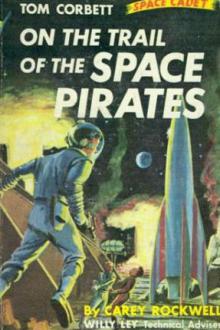Triplanetary E. E. Smith (jenna bush book club .txt) 📖

- Author: E. E. Smith
Book online «Triplanetary E. E. Smith (jenna bush book club .txt) 📖». Author E. E. Smith
Five yards apart, the gladiators stopped and wheeled to face the podium upon which Nero lolled. The buzz of conversation—the mace had excited no little comment and speculation—ceased. Patroclus heaved his ponderous weapon into the air; the Gaul whirled up his long, sharp sword. They chanted in unison:
“Ave, Caesar Imperator!
Morituri te salutant!”
The starting-flag flashed downward; and at its first sight, long before it struck the ground, both men moved. Fermius whirled and leaped; but, fast as he was, he was not quite fast enough. That mace, which had seemed so heavy in the Thracian’s hands a moment before, had become miraculously maneuverable—it was hurtling through the air directly toward the middle of his body! It did not strike its goal—Patroclus hoped that he was the only one there who suspected that he had not expected it to touch his opponent—but in order to dodge the missile Fermius had to break his stride; lost momentarily the fine coordination of his attack. And in that moment Patroclus struck. Struck, and struck again.
But, as has been said, Fermius was both strong and fast. The first blow, aimed backhand at his bare right leg, struck his shield instead. The left-handed stab, shield-encumbered as the left arm was, ditto. So did the next trial, a vicious forehand cut. The third of the mad flurry of swordcuts, only partially deflected by the sword which Fermius could only then get into play, sheared down and a red, a green, and a white plume floated toward the ground. The two fighters sprang apart and studied each other briefly.
From the gladiators’ standpoint, this had been the veriest preliminary skirmishing. That the Gaul had lost his plumes and that his armor showed great streaks of missing enamel meant no more to either than that the Thracian’s supposedly surprise attack had failed. Each knew that he faced the deadliest fighter of his world; but if that knowledge affected either man, the other could not perceive it.
But the crowd went wild. Nothing like that first terrific passage-at-arms had ever before been seen. Death, sudden and violent, had been in the air. The arena was saturated with it. Hearts had been ecstatically in throats. Each person there, man or woman, had felt the indescribable thrill of death—vicariously, safely—and every fiber of their lusts demanded more. More! Each spectator knew that one of those men would die that afternoon. None wanted, or would permit them both to live. This was to the death, and death there would be.
Women, their faces blotched and purple with emotion, shrieked and screamed. Men, stamping their feet and waving their arms, yelled and swore. And many, men and women alike, laid wagers.
“Five hundred sesterces on Fermius!” one shouted, tablet and stylus in air.
“Taken!” came an answering yell. “The Gaul is done—Patroclus all but had him there!”
“One thousand, you!” came another challenge. “Patroclus missed his chance and will never get another—a thousand on Fermius!”
“Two thousand!”
“Five thousand!”
“Ten!”
The fighters closed—swung—stabbed. Shields clanged vibrantly under the impact of fended strokes, swords whined and snarled. Back and forth—circling—giving and taking ground—for minute after endless minute that desperately furious exhibition of skill, of speed and of power and of endurance went on. And as it went on, longer and longer past the time expected by even the most optimistic, tension mounted higher and higher.
Blood flowed crimson down the Gaul’s bare leg and the crowd screamed its approval. Blood trickled out of the joints of the Thracian’s armor and it became a frenzied mob.
No human body could stand that pace for long. Both men were tiring fast, and slowing. With the drive of his weight and armor, Patroclus forced the Gaul to go where he wanted him to go. Then, apparently gathering his every resource for a final effort, the Thracian took one short, choppy step forward and swung straight down, with all his strength.
The blood-smeared hilt turned in his hands; the blade struck flat and broke, its length whining viciously away. Fermius, although staggered by the sheer brute force of the abortive stroke, recovered almost instantly; dropping his sword and snatching at his gladius to take advantage of the wonderful opportunity thus given him.
But that breaking had not been accidental; Patroclus made no attempt to recover his balance. Instead, he ducked past the surprised and shaken Gaul. Still stooping, he seized the mace, which everyone except he had forgotten, and swung; swung with all the totalized and synchronized power of hands, wrists, arms, shoulders, and magnificent body.
The iron head of the ponderous weapon struck the center of the Gaul’s cuirass, which crunched inward like so much cardboard. Fermius seemed to leave the ground and, folded around the mace, to fly briefly through the air. As he struck the ground, Patroclus was upon him. The Gaul was probably already dead—that blow would have killed an elephant—but that made no difference. If that mob knew that Fermius was dead, they might start yelling for his life, too. Hence, by lifting his head and poising his dirk high in air, he asked of Caesar his Imperial will.
The crowd, already frantic, had gone stark mad at the blow. No thought of mercy could or did exist in that insanely bloodthirsty throng; no thought of clemency for the man who had fought such a magnificent fight. In cooler moments they would have wanted him to live, to thrill them again and yet again; but now, for almost half an hour, they had been loving the hot, the suffocating thrill of death in their throats. Now they wanted, and would have, the ultimate thrill.
“Death!” The solid structure rocked to the crescendo roar of the demand. “Death!





Comments (0)